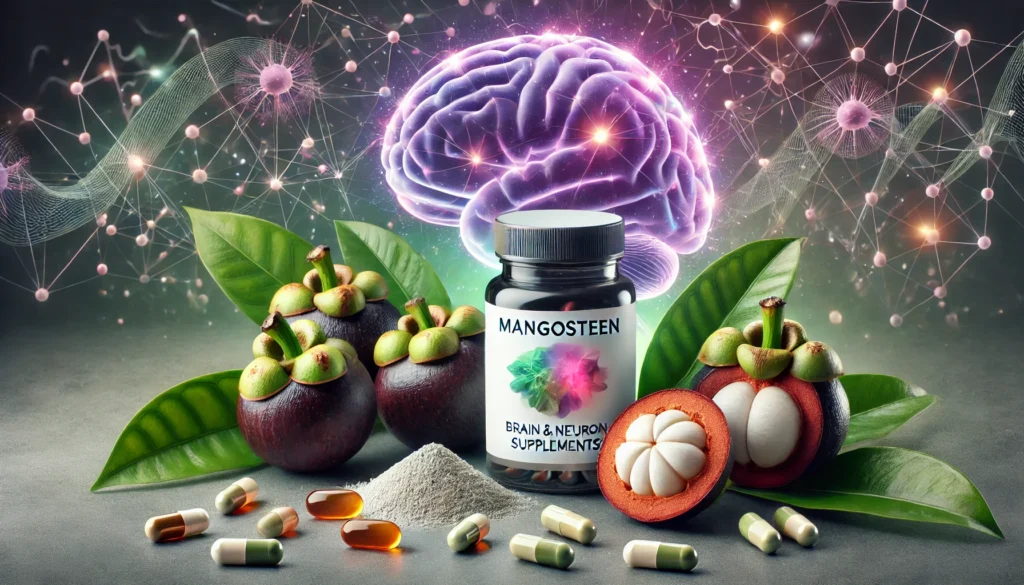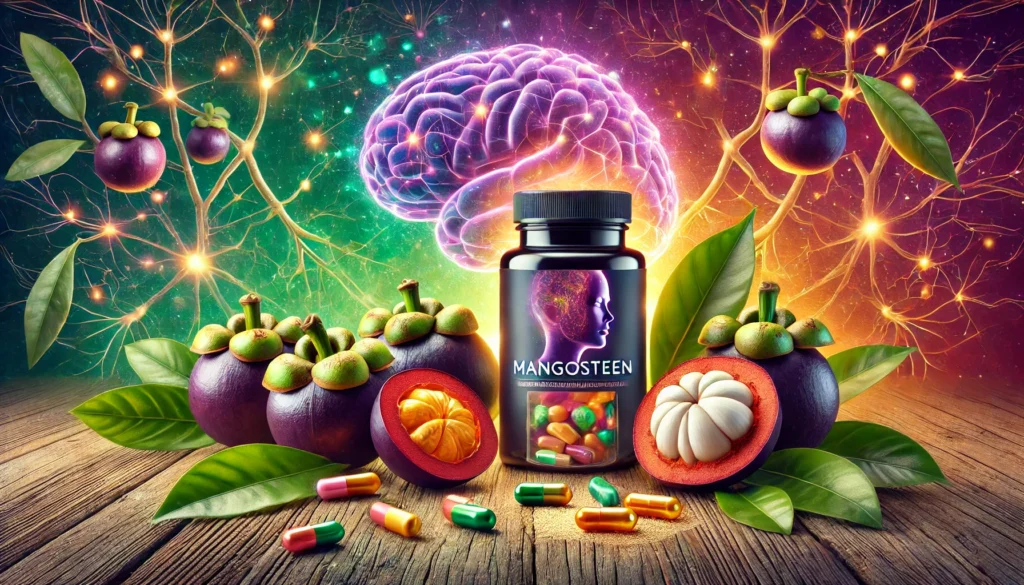Mangosteen (Garcinia mangostana) is a tropical fruit native to Southeast Asia, renowned for its unique taste and medicinal qualities. Over recent years, mangosteen has attracted significant scientific interest for its rich nutritional profile, particularly for its potential as a nootropic supplement that may support cognitive function. Known as the “queen of fruits,” mangosteen contains a variety of phytochemicals that have been studied for their health benefits, particularly those that may protect brain health and enhance cognitive performance. This article delves into mangosteen’s chemistry, potential nootropic effects, recommended dosage, possible side effects, and considerations for safe supplementation. It also discusses mangosteen’s active ingredients and their physiological mechanisms of action in the body and brain.
You May Also Like:
Mangosteen: Potential Nootropic Benefits, Dosage, Side Effects, Interactions, and Other Important Information About This Supplement is an original (NootropicsPlanet) article.
Sources of Mangosteen
Mangosteen is primarily grown in tropical climates, especially in Southeast Asian countries like Thailand, Malaysia, and Indonesia. Its fruit, distinguished by a thick purple rind and a juicy, white pulp, has long been used in traditional medicine across Asia. Mangosteen supplements are typically derived from the fruit’s rind (pericarp), as it is rich in xanthones—bioactive compounds believed to be responsible for many of mangosteen’s purported health benefits.

Key Sources and Forms of Mangosteen Supplements:
- Whole Fruit: Fresh mangosteen fruit is often consumed in regions where it is available. It provides antioxidants and fiber, though access outside of its growing regions can be limited.
- Powdered Extracts: Mangosteen pericarp is dried and ground into a powder, which can be used as a standalone supplement or added to smoothies or food.
- Capsules and Tablets: Mangosteen supplements are available in capsule and tablet form, offering a convenient way to consume the fruit’s bioactive compounds, especially for nootropic purposes.
- Liquid Extracts: Liquid extracts of mangosteen are sometimes sold in health stores. These extracts typically contain concentrated xanthones and other beneficial compounds.
Chemistry of Mangosteen
Mangosteen is rich in a variety of bioactive compounds, with the most notable being xanthones. Xanthones are a class of polyphenolic compounds with potential antioxidant, anti-inflammatory, and neuroprotective properties. The two most abundant xanthones in mangosteen are alpha-mangostin and gamma-mangostin. Research has shown that these compounds may contribute to brain health by reducing oxidative stress and inflammation, both of which are linked to cognitive decline and neurodegenerative diseases.
Important Phytochemicals in Mangosteen:
- Alpha-Mangostin: This xanthone is known for its potent antioxidant properties. It scavenges free radicals and protects cells, including neurons, from oxidative damage. By reducing oxidative stress in the brain, alpha-mangostin may help preserve cognitive function.
- Gamma-Mangostin: Gamma-mangostin exhibits anti-inflammatory effects by inhibiting the activity of COX-2, an enzyme associated with inflammatory processes. Chronic inflammation in the brain is linked to conditions like Alzheimer’s disease, and gamma-mangostin’s anti-inflammatory properties may therefore offer neuroprotective benefits.
- Catechins and Epicatechins: Found in smaller quantities, these compounds are similar to those found in green tea and have antioxidant and neuroprotective properties.
- Polyphenolic Compounds: Other polyphenols in mangosteen support cellular health and may contribute to enhanced cognitive performance by promoting neuronal resilience.
Physiological Mechanisms of Mangosteen in the Body and Brain
The physiological effects of mangosteen on the body and brain are primarily driven by its antioxidant and anti-inflammatory properties. Here’s a closer look at how mangosteen’s active compounds act within the brain:
Antioxidant Defense
The brain is particularly vulnerable to oxidative stress due to its high oxygen consumption and lipid-rich environment. Oxidative stress can damage neurons, contributing to cognitive decline and neurodegenerative diseases. Alpha-mangostin and gamma-mangostin in mangosteen effectively neutralize free radicals, protecting neurons from oxidative damage. By reducing oxidative stress, mangosteen may slow brain aging and support cognitive clarity.
Anti-Inflammatory Effects
Chronic neuroinflammation is associated with various mental health disorders and neurodegenerative diseases. Gamma-mangostin has been shown to inhibit inflammatory enzymes and cytokines in the brain, potentially reducing inflammation and promoting cognitive health. These anti-inflammatory effects could make mangosteen a supportive agent for mental clarity and cognitive endurance.
Enhancement of Mitochondrial Function
Healthy mitochondrial function is crucial for maintaining cognitive performance, as neurons require substantial energy to communicate efficiently. Alpha-mangostin supports mitochondrial function by enhancing ATP production, ensuring neurons receive a steady supply of energy for optimal function.

Nootropic Benefits of Mangosteen
While mangosteen is not widely recognized as a traditional nootropic, its effects on brain health and cognitive function suggest that it may offer several nootropic benefits. Here are some potential cognitive benefits associated with mangosteen supplementation:
- Cognitive Clarity and Focus: Mangosteen’s antioxidant properties may help preserve cognitive function by reducing oxidative damage to neurons. This protection may result in enhanced clarity and focus, particularly for individuals experiencing brain fog or mild cognitive fatigue.
- Memory Support: Through its anti-inflammatory and neuroprotective properties, mangosteen may help preserve memory function. Studies have linked chronic inflammation to memory impairment, suggesting that mangosteen’s ability to lower inflammation may support memory retention.
- Mood Regulation: Inflammation and oxidative stress are often linked to mood disorders, including anxiety and depression. By reducing these factors, mangosteen may help stabilize mood and support mental well-being. While further research is needed, early studies indicate that mangosteen’s compounds may play a role in mood regulation.
- Neuroprotection: Mangosteen’s xanthones offer neuroprotective effects by reducing the risk of neuron degeneration. This protection may be beneficial for individuals at risk of age-related cognitive decline or neurodegenerative diseases.

Dosage and Supplementation Guidelines
There is currently no established daily recommended dosage for mangosteen supplements, as research on its nootropic use is still emerging. However, various dosages have been suggested based on animal studies and anecdotal evidence:
- General Cognitive Support: For general nootropic use, a daily dose of 500-1,000 mg of mangosteen extract is commonly suggested. This dosage may provide antioxidant and anti-inflammatory benefits without exceeding safe limits.
- Specific Brain Health Support: For individuals targeting specific cognitive outcomes, such as memory support or focus, a higher dosage of 1,500-2,000 mg of mangosteen extract may be appropriate. However, this should be done with caution, as high doses may increase the risk of side effects.
- Forms of Supplementation: Mangosteen supplements are available as capsules, powders, and liquid extracts. Capsules are often the most convenient form, providing precise dosing. Liquid extracts may offer faster absorption, though they may have a strong taste.
Precautions with Dosage
Given mangosteen’s lack of established dosage standards, it is advisable to start with a lower dose and gradually increase as needed, paying close attention to any adverse effects. Consulting with a healthcare provider is recommended, especially for individuals with pre-existing health conditions.
Side Effects and Safety
Mangosteen is generally considered safe when consumed in moderate amounts, particularly when taken as a supplement. However, some potential side effects have been reported:
- Digestive Issues: At higher doses, mangosteen may cause digestive discomfort, including gas, bloating, and mild stomach upset. This effect is likely due to the fiber and certain tannins in the fruit’s pericarp.
- Potential Allergic Reactions: Although rare, some individuals may be allergic to mangosteen. Symptoms of an allergic reaction include itching, swelling, and difficulty breathing. Anyone experiencing these symptoms should discontinue use immediately and consult a healthcare provider.
- Oxalate Content: Mangosteen contains oxalates, which can contribute to kidney stone formation in susceptible individuals. Those with a history of kidney stones should use mangosteen cautiously.
- Increased Bleeding Risk: Mangosteen may have mild anticoagulant properties, potentially increasing bleeding risk. Individuals on blood-thinning medications should avoid mangosteen or consult their doctor before using it.

Interactions with Other Supplements and Medications
Mangosteen may interact with various medications and supplements. Here’s a closer look at some of the most notable interactions:
- Anticoagulants: Mangosteen’s potential blood-thinning effects may interact with anticoagulant medications, such as warfarin or aspirin, enhancing the risk of bleeding. Individuals on blood-thinning medications should avoid mangosteen or seek medical advice.
- Anti-Inflammatory Drugs: Mangosteen’s anti-inflammatory properties may have additive effects when combined with NSAIDs (nonsteroidal anti-inflammatory drugs). This could increase the risk of gastrointestinal side effects.
- Antidepressants: The neuroprotective and mood-stabilizing effects of mangosteen may theoretically complement certain antidepressants. However, this interaction is not fully understood, so caution is advised.
- Other Nootropics: Mangosteen can generally be combined with other nootropics, like bacopa or L-theanine, as long as total antioxidant and anti-inflammatory intake is monitored. Synergistic effects are possible, but users should avoid combining high doses of multiple nootropic supplements without professional guidance.
Conclusion
Mangosteen is a promising, natural supplement with unique potential as a nootropic. While it is best known for its antioxidant and anti-inflammatory properties, emerging research suggests that mangosteen may support cognitive clarity, memory, and mood stability. By protecting neurons from oxidative damage and reducing neuroinflammation, mangosteen may offer gentle yet significant support for mental health.
However, due to the limited research on its effects on humans, mangosteen supplementation should be approached with caution. Starting with a low dose and consulting with a healthcare provider can help mitigate any risks. Additionally, individuals taking anticoagulants or with a history of kidney stones should be particularly cautious.
As research into mangosteen’s bioactive compounds progresses, it may become a widely accepted nootropic supplement with broader applications for cognitive health. For now, it remains a valuable option for those interested in natural approaches to supporting their mental well-being.

References:
- 11 Health Benefits of Mangosteen (And How to Eat It). Retrieved from: https://www.healthline.com/nutrition/mangosteen
- Health Benefits of Mangosteen. Retrieved from:https://www.webmd.com/vitamins/ai/ingredientmono-1081/mangosteen
- Everything you need to know about mangosteen. Retrieved from: https://www.medicalnewstoday.com/articles/mangosteen
- Is Mangosteen Good for You? Retrieved from: https://www.verywellhealth.com/mangosteen-benefits-nutrition-8584004
Important Note: The information contained in this article is for general informational purposes only, and should not be construed as health or medical advice, nor is it intended to diagnose, prevent, treat, or cure any disease or health condition. Before embarking on any diet, fitness regimen, or program of nutritional supplementation, it is advisable to consult your healthcare professional in order to determine its safety and probable efficacy in terms of your individual state of health.
Regarding Nutritional Supplements Or Other Non-Prescription Health Products: If any nutritional supplements or other non-prescription health products are mentioned in the foregoing article, any claims or statements made about them have not been evaluated by the U.S. Food and Drug Administration, and such nutritional supplements or other health products are not intended to diagnose, treat, cure, or prevent any disease.


